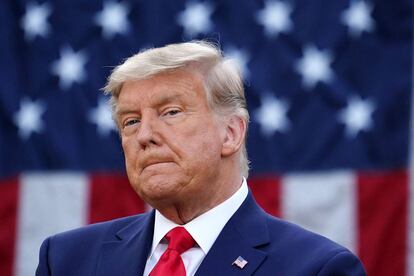Getting Trump indicted: The prosecution’s ham sandwich
The investigation’s evidence against the former president was put to a grand jury, a method that guarantees indictments in almost 95% of cases


Donald Trump was indicted on Thursday over his handling of classified documents. The Republican, who is seeking a return to the White House in 2024, has become the first former president to face criminal charges for federal crimes in the United States. This judicial procedure adds to a long list that the controversial politician has been dragging through the courts. His latest run for the presidency has now been put to the test by a grand jury. This is a variation on the traditional court system we are used to seeing in movies and TV series. In 95% of cases, this procedure results in indictments.
The indictment against Trump, the second so far in 2023, has sent seismic ripples through U.S. politics. Especially among the Republican Party. Kevin McCarthy, the Speaker of the House of Representatives, has criticized the move, unveiled by the former president on his social network, Truth Social. “It is unconscionable for a President to indict the leading candidate opposing him,” the congressman wrote on Twitter.
In reality, Trump’s new judicial troubles have been the outcome of a grand jury convened in Miami. Unlike ordinary trials, composed of a judge, 12 jurors, and attorneys for the prosecution and the defense, this indictment has been decided by a panel composed of 23 people. At least 12 had to vote to indict the former president on what appears so far to be seven counts, including: willful retention of national security documents in violation of the Espionage Act, making false statements and conspiracy to obstruct justice. Trump could be sentenced to several years in prison if found guilty. For the time being, the politician is due to be arraigned Tuesday at 3.00 pm in a district court in the city.
Grand jury indictments are often controversial, especially because the accusation is decided in complete secrecy, something that contrasts with the absolute transparency that is the aspiration of regular court trials. Grand jury sessions are conducted over a longer period of time, which can range from 18 to 36 months. During this time, a “special counsel” is appointed, in this case Jack Smith, who presents the evidence they have been able to obtain to support the prosecution. This time it was witness testimonies, security camera footage from Trump’s Florida mansion, Mar-a-Lago, and other documentary evidence. Jury members meet at least once a week or a couple of times a month to evaluate these elements.
All of this takes place behind closed doors. Neither a judge nor a defense attorney is present at the trial. Unlike ordinary trials, where the prosecution must prove the case beyond reasonable doubt, the goal of prosecutors is to convince a majority of the grand jury that they have a strong enough case to secure a conviction in court and before a judge; a process that can take months and even years. According to the Department of Justice’s Bureau of Justice Statistics, 95-99% of cases presented to a grand jury result in an indictment.
This high percentage has provoked criticism of the procedure. In March, when news broke that Trump had been indicted for paying hush money to the porn actress known as Stormy Daniels, former Vice President Mike Pence (who is trying to secure the 2024 Republican nomination) recalled an old saying popular in law schools: “You can indict a ham sandwich,” he said on CNN. The former Indiana governor’s words to journalist Wolf Blitzer underscore how easy it is to secure an indictment via grand jury.
Now begins the most arduous task for the Office of the Special Counsel, which must prepare for the case to move through a court of law. For the time being, Trump must appear before a judge next week. The magistrate will then determine the ex-president’s bail conditions. After that, the prosecution led by Smith must share the evidence against Trump with the White House hopeful’s lawyers. A trial date should be set in the next 70 days, although this is not derailing Trump’s ambitions to regain power,
Sign up for our weekly newsletter to get more English-language news coverage from EL PAÍS USA Edition
Tu suscripción se está usando en otro dispositivo
¿Quieres añadir otro usuario a tu suscripción?
Si continúas leyendo en este dispositivo, no se podrá leer en el otro.
FlechaTu suscripción se está usando en otro dispositivo y solo puedes acceder a EL PAÍS desde un dispositivo a la vez.
Si quieres compartir tu cuenta, cambia tu suscripción a la modalidad Premium, así podrás añadir otro usuario. Cada uno accederá con su propia cuenta de email, lo que os permitirá personalizar vuestra experiencia en EL PAÍS.
¿Tienes una suscripción de empresa? Accede aquí para contratar más cuentas.
En el caso de no saber quién está usando tu cuenta, te recomendamos cambiar tu contraseña aquí.
Si decides continuar compartiendo tu cuenta, este mensaje se mostrará en tu dispositivo y en el de la otra persona que está usando tu cuenta de forma indefinida, afectando a tu experiencia de lectura. Puedes consultar aquí los términos y condiciones de la suscripción digital.








































